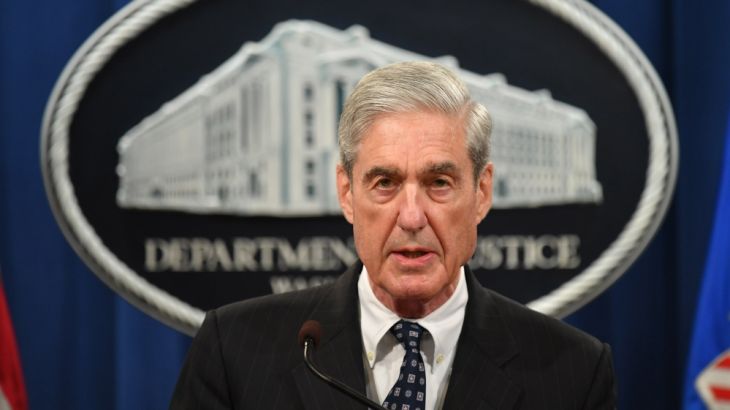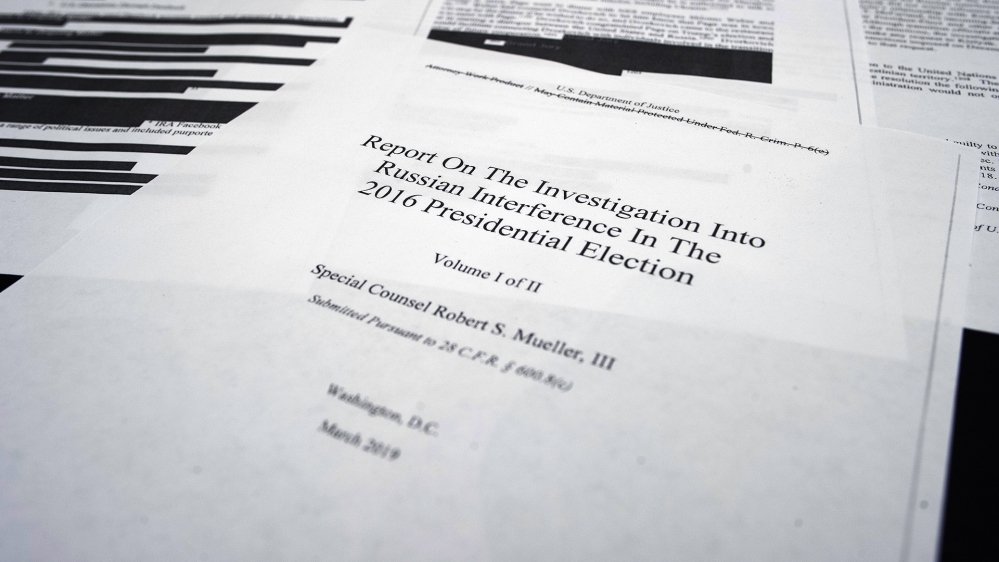Robert Mueller testifies: Six things to know
What questions will be asked? What will he say? Six things to know about Mueller’s highly-anticipated testimony.

Washington, DC – It will be a day likely to go down in US history books. After more than two years of silence aside from a brief public statement on the release of his 448-page report about his Russia probe, former Special Counsel Robert Mueller will testify publicly for the first time on Wednesday before two committees – the Judiciary and Intelligence panels – of the United States House of Representatives.
A central question: Did he intend for Congress to continue his probe into possible obstruction of justice by President Donald Trump?
Keep reading
list of 4 itemsFar-right German politician’s aide arrested for spying for China
‘Can’t give them jobs’: Rwandans grapple with fears over UK asylum plan
UK passes law to send asylum seekers to Rwanda after months of wrangling
Democrats will likely focus on what they consider to be the damning parts of the Mueller’s report, chiefly, the instances outlined by Mueller in which Trump may have obstructed justice.
Republicans will likely seek to demonstrate the Mueller probe has ended and conclusions made, and therefore the issue should be dropped.
Here are six things to know going into Wednesday’s testimony:
1. When and where?
Mueller will testify before the House Judiciary and House Intelligence Committees.
The House Judiciary hearing is scheduled to begin at 8:30am (12:30 GMT) and will last for about three hours. Questioning in the House Judiciary Committee will focus on Trump’s attempts to block or bring to an end Mueller’s investigation of Russian interference in the 2016 election that Trump won.
The House Intelligence Committee hearing will likely start around 12:00pm (16:00 GMT) and will last for about two hours. It is expected to focus on the Russian hacks, contacts between Trump associates and Russian operatives, and Trump’s secret push during the 2016 campaign to develop a Trump Tower real estate project in Moscow.
After his public testimony, Mueller will appear again behind closed doors before both committees for discussions on topics that may be classified as government secrets.
Mueller’s top aide, Aaron Zebley, will be allowed to sit at the table with him. Zebley is not expected to be sworn in before the House Judiciary Committee, but according to US media, will likely be sworn in and asked questions during the House Intelligence hearing. Trump called the Democrats’ decision to allow Zebley to appear “a disgrace”.
2. What should we expect from Mueller?
Mueller is known as a “by-the-book” law enforcement professional, meaning he will speak very carefully and stay within guidelines about what he can and he cannot say.
In a press conference on May 29, in which Mueller announced his resignation as special counsel and closure of the investigation, Mueller had said he would prefer not to testify before Congress. Instead, he urged that “the office’s written work speak for itself”.
Democrats in the House, however, insisted that after nearly two years of investigation, a 448-page report that was completed in March but only partially released in April, the American public had a right to hear directly from Mueller. Both committees issued subpoenas demanding Mueller’s testimony and he agreed to comply.
“It is incredibly important to hear from Bob Mueller at this point,” said Democrat Pramila Jayapal, who is among a number of members of the House who have called on Speaker Nancy Pelosi to allow impeachment proceedings against Trump.
Committee members have told Al Jazeera that Mueller has made clear any testimony would not go beyond what is in the report. House Democrats, who believe the Trump administration has mischaracterised what is in the report, see great value in having Mueller appear live and in person on national television to explain his team’s findings and analysis.
3. What questions will Mueller be asked?
The House Judiciary and Intelligence committee members and staff lawyers have been preparing questions for Mueller’s testimony designed to probe the former special counsel’s view on some key issues, including obstruction and collusion.
A redacted version of the Mueller report published in April concluded there was no conspiracy between the Trump campaign and Moscow. But Mueller declined to make a judgment on whether Trump obstructed justice, though the report outlined 10 instances in which Trump tried to impede the investigation.
US Attorney General William Barr and former Deputy Attorney General Rod Rosenstein subsequently determined Trump had not broken the law.
Mueller said in May that charging Trump was never an option for his team of prosecutors, citing Justice Department guidelines that prohibit charging a sitting president.
“Charging the president with a crime was … not an option we could consider,” Mueller said in a brief press conference.
“We concluded that we would not reach a determination one way or the other about whether the president committed a crime,” he said. “If we had confidence that the president clearly did not commit a crime, we would have said so. We did not, however, make a determination as to whether the president did or did not.”
Three main questions will be of particular importance on Wednesday:
- Did you believe Justice Department policy prevented you from seeking an indictment of President Trump for obstruction of justice that would otherwise have been warranted by the evidence you outlined?
- Did Attorney General William Barr misrepresent your investigative findings to the American people when he issued his four-page statement saying there was no collusion and ruling there was no obstruction of justice?
- Why did you elect not to pursue an interview with Donald Jr about the negotiations for Trump Tower Moscow and other contacts with Russia, and did his refusal to be interviewed affect the investigation? If so, how? Was the Trump Tower Moscow project used by the Russians as part of an effort to gain influence over Trump?
4. Why does Mueller’s appearance matter?
Mueller’s testimony before Congress will be a defining moment in Trump’s presidency and potentially a watershed moment for the US. Americans are to a large extent unaware of what is actually in Mueller’s report, in part because it is nearly 450 pages of somewhat dry investigative documentation, and because many people, including several members of Congress, have admittedly not read the entire document. Even then there are important portions of the report that were redacted.
Attorney General Barr said in a press conference on April 18 that the special counsel’s investigation did not find evidence of a conspiracy between the Trump campaign and Russia. And further that he and his deputy Rosenstein, who had overseen the investigation, determined the president had not committed chargeable crimes of obstruction of justice.
Democrats, once they had a chance to read and study the report, have cried foul, pointing to several instances outlined in the report detailing how Trump potentially obstructed justice.
“What we are hoping for is that there will be some public clarity about what is really in the Mueller report. We want some basic public education about it,” Representative Jamie Raskin recently told reporters.
“There were 10 episodes of obstruction of justice detailed in the report. There’s actually massive evidence of collusion between the Trump campaign and Russian nationals,” he added. “The only expectation we have of Robert Mueller is the truth. Barr and Trump have left a thick fog of propaganda hanging over America. We just want to clear the fog.”

Trump has repeatedly called Mueller’s investigation a “witch-hunt” based on a “hoax” perpetrated by Democrats. And, although Trump has claimed Mueller’s report exonerated him and his campaign, purportedly by showing “no collusion, no obstruction”, the president has attempted to block former White House staff from testifying.
The Department of Justice (DOJ) sent a letter to Mueller this week, telling the former special counsel there “should be no testimony concerning the redacted portions of the public version of your report”.
It added that it is “the department’s long standing policy not to discuss the conduct of uncharged third-parties”.
Finally, the letter said, “Any testimony must remain within the boundaries of your public report because matters within the scope of your investigation were covered by executive privilege.”
The DOJ said it was providing the letter in response to a request from Mueller for guidance about “privilege and other legal bars” relating to the testimony.
5. Impeachment? What can Congress do?
Pelosi and Democrat leaders in the House have held back from opening impeachment proceedings against Trump. One important reason is that Trump’s Republican Party controls the US Senate which would have to conduct a trial and vote to convict the president if the Democratic-controlled House voted to impeach.
“Two-thirds of the Senate will never agree to convict and then to have him waving a non-conviction in front of the voters next year and say, ‘I am not guilty of everything’, simply because a political group decided he wasn’t, that’s not what we are going to do,” Representative Jim Clyburn, the number three Democrat leader in the House, recently told Al Jazeera.
But the pressure to begin impeachment is building among rank-and-file Democrats in the House.
Republicans have stayed close to Trump. Only one, Justin Amash, has said the Mueller report contains impeachable offences, and he has left the party to become an independent.
Even so, Democrats in the House are proceeding with six committee investigations of findings of the Mueller report as well as Trump’s financial dealings and other matters. The sweeping inquiry, which Trump has attempted to slow down by refusing to allow White House cooperation, threatens to eventually expose more damaging information about Trump’s conduct.
Meanwhile, Democrats and Republicans are watching public opinion closely. Although support for impeaching Trump has been inching up in recent weeks, a majority of Americans do not favour it now. Democrats who favour impeachment hope Mueller’s testimony shifts public opinion in their direction.
“Impeachment is a political process,” Representative Sheila Jackson-Lee told reporters. “We expect that with the way we are doing it, the American people will be there as needed as necessary in this instance.”
6. Background: Who is Robert Mueller?
Mueller, 74, is a career federal law enforcement official. He became FBI director a week before the September 11, 2001, attacks on New York and Washington, DC. Serving under both former Presidents George W Bush and Barack Obama until 2013, Mueller earned a reputation for integrity and non-partisanship during a challenging period.
Mueller served in the Marines as an officer during the Vietnam War from 1968 to 1970, was wounded in combat and earned medals for valour. After returning home, he attended law school and entered the practice as a litigator before joining the DOJ as a prosecutor. During his career, he oversaw high-profile federal cases against Panamanian drug trafficker Manuel Noriega, the Pan Am flight 103 bombers and mafia boss John Gotti.
Mueller was named to take over the FBI’s Russia investigation as a special counsel in May 2017 after Trump abruptly fired then-FBI Director James Comey.